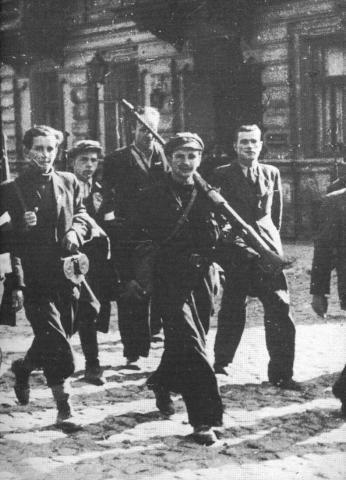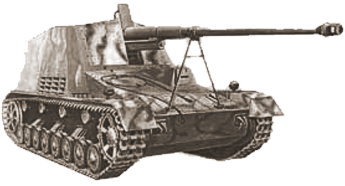The Warsaw Uprising: August 1944

Following the Red Army's stunning June-July 1944 defeat of Germany's Army Group Center, and the subsequent Soviet drive into Eastern Poland, one of the great tragedies of World War II unfolded in Warsaw. On August 1st 1944, the long-suffering Polish resistance and population, led by Polish Brigadier General Bor-Komorowski, launched a city wide uprising as the Red Army's 1st Belorussian Front approached Praga and crossed the Vistula. Though horribly equipped and completely reliant on anticipated outside assistance from the Allies and Red Army the Poles more than made up for their lack of armament with ample doses of fighting spirit and bravery. The Polish Home Army's initial success in seizing strategic positions across Warsaw quickly forced Hitler to order substantial German forces into the city in response. Stalin, in spite of the military opportunity posed through leveraging the Polish resistance against the German Ninth and Second Army's outside Warsaw however mostly choose to ignore the Polish pleas for support; almost entirely because of Stalin's own cruel political logic.
Furthermore, Stalin actively opposed American and British attempts to help the Polish resistance; albeit Allied offers of assistance were decidedly weak given that the Free Polish Government in London was seeking a postwar settlement recognizing Poland's pre-war borders; a position the Allies, busy divvying up Europe with Stalin, found highly inconvenient. Meanwhile, Hitler and Himmler, ever the predatory opportunists, took advantage of the Poles isolation and ordered in the SS to first brutally slaughter everyone in Warsaw and second, level the once great city. As for Stalin, he held almost no sympathies for the Poles in part likely stemming from his blaming the Poles for his own military failings, and subsequent embarrassment, during the brief war fought between Poland and the Soviet Union following the First World War. In addition, in the past he had acted with a murderous zeal to guarantee his State's primacy in Eastern Europe. Most notably when he had presided over the mass murder of 26,000 Polish officers captured in 1939; given he viewed their repatriation as a potential political threat to his rule over the parts of Eastern Poland he had cravenly secured by his August 1939 pact with Hitler.
Thus Stalin, a war criminal himself in every sense of the word, remained the ultimate political animal; as such, he realistically regarded extending aid to Polish Nationalists as against his own interests. The Polish resistance could prove just as capable of making Soviet rule over Poland more difficult than needed. So why waste the Red Army's resources in what augured to be a bloody battle for Warsaw? Stalin, said as much via a Soviet news report, through TASS, on August 13th and directly to Churchill on the 16th. As a result, the Polish Home Army received almost no support from the Red Army. Though some units from the Polish 1st Army, part of the 1st Belorussian Front, attempted to cross the Vistula and assist the resistance, their parent formation refused to support their efforts and the Germans decimated the few infantry battalions to make it across the river.
Left alone to fight and die nevertheless the Poles bravely fought for their survival against the remorseless and ruthless SS led German forces. The German units assembled to crush the rebellion; led by SS, police and other security forces but also including regular army units ranked as some of the War's most vile criminals; with many of the men serving in their ranks just that. For instance, the SS "Dirlewanger" Division, named after it commander, and deployed to crush the insurrection was filled with convicts on probation. SS Oberfuhrer Bronislav Kaminski's RONA Sturmbrigade also entered Warsaw with its ranks fleshed out by criminals recruited in part by offering them the opportunity to murder, rape, and loot without abandon - women and children represented chief sources of entertainment for the sadistic SS officers and men. All of which took place under the oversight of the German Ninth Army's HQ; a regular army command staff which knew exactly what was going on and yet committed front line infantry, armor, pioneers and artillery to join the slaughter. Even with the support provided by the Ninth Army, the Poles fought with strength and determination and, with German forces outside the city engaged in a desperate struggle against the 1st Belorussian Front, the uprising took far longer to put down than the Germans wanted. As a result, and in order to induce an end to the fighting in the city, Hitler backed off on his goal of total annihilation and promised to treat the Poles as regular combatants if they surrendered with a further promise to abstain from additional reprisals against the local population.
On October 5th Komorowski's exhausted remaining 17,000 fighters, low on ammunition and lacking outside support, formerly capitulated. Estimates regarding the toll in human life vary. That said, most credible studies show that of Warsaw's population, standing at one million prior to the uprising's immediate onset, the Germans murdered approximately 180,000-250,000 civilians with an additional 10,000-16,000 Polish Home Army fighters killed in the fighting. Even while holding overwhelming advantages in modern military hardware, including tanks, artillery and other heavy weapons the Germans paid a stiff price for putting down the rebellion. According to some estimates the Germans lost 19,000 dead of their own, others claim as few as 2,000 Germans were killed; what is certain is that the Germans lost far more men than one would have expected. In addition, the defeat of the Polish resistance in Warsaw did not mean the end of Polish resistance. Polish partisan activity continued their fight, albeit on a much smaller scale, and many members of the Home Army joined the Red Army and later fought their way into Germany with the Polish 1st Army; playing a significant role in the fighting in and around Berlin during the late winter and spring of 1945.
By Steven D. Mercatante



Post new comment